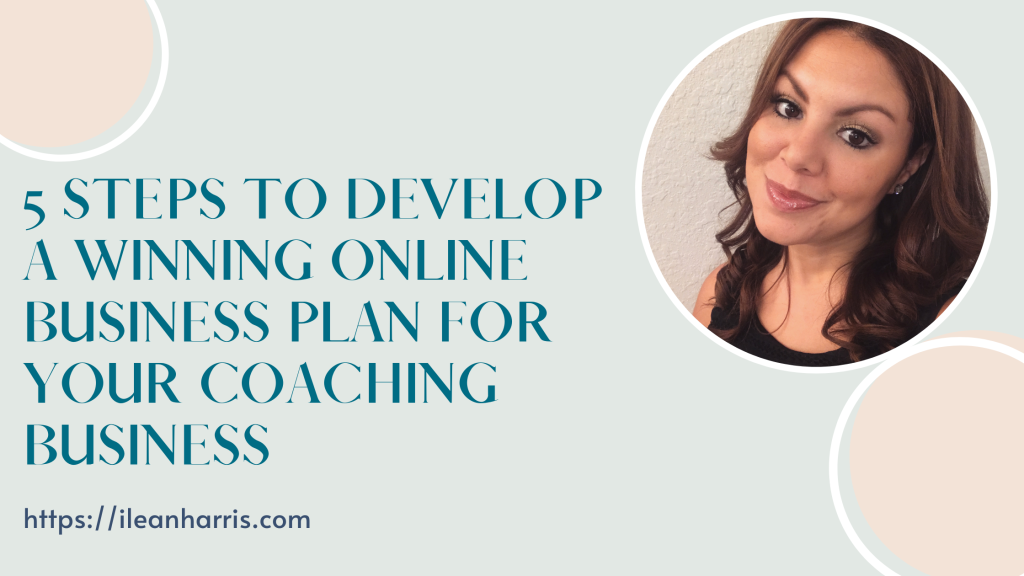This post is all about business plan.

5 Steps to Develop a Winning Online Business Plan for Your Coaching Business
If you’re a coach looking to start or expand your coaching business, having a winning online business plan is essential.
I have grown my business in over 20 countries from my laptop without a giant binder with a business plan in it. That doesn’t mean that there wasn’t a plan. The digital world has inspired business plans to look a little different and even a little less intimidating.
I am so excited to share with you a business plan outline and strategies that will work for you. Adjust as needed for your own goals and timelines for your business. But definitely take the time to develop your business plan. As they say, if you fail to plan, you plan to fail.
Let’s dive in.
An online business plan will help you clarify your business goals, target your ideal clients, and outline your marketing and sales strategies.
Business Plan
Here are five steps to help you develop a winning online business plan for your coaching business:
- Define your business goals: Start by defining your business goals. What are you looking to achieve with your coaching business? Are you looking to grow your client base, increase your revenue, or expand your services? Your goals will help shape the direction of your business plan.
- Identify your target audience: Your target audience is the group of people you want to attract to your coaching business. Identify your ideal clients and their needs. What problems are they facing that your coaching services can help solve? Understanding your target audience will help you tailor your marketing and sales strategies to reach them effectively.
- Develop your marketing and sales strategies: Based on your business goals and target audience, develop a marketing and sales strategy that will help you achieve those goals. Consider tactics such as social media advertising, email marketing, and webinars to reach your target audience and promote your coaching services.
- Outline your financial projections: Your financial projections should include revenue goals, expenses, and cash flow projections. This will help you understand the financial feasibility of your coaching business and ensure that your revenue goals are aligned with your expenses.
- Review and revise your plan: Once you’ve developed your online business plan, review it regularly and revise it as needed. Your plan should be a living document that reflects changes in your coaching business and market conditions. Consider hiring a business coach or mentor to help you review and refine your plan.
Developing a winning online business plan is crucial for the success of your coaching business.
Click here for business ideas for entrepreneurs.
By defining your business goals, identifying your target audience, developing your marketing and sales strategies, outlining your financial projections, and regularly reviewing and revising your plan, you can create a roadmap to success for your coaching business.
Launching with a webinar can be an effective way to promote your coaching services and reach a large audience.
Here are some steps you can follow to launch with a webinar after completing your coaching business plan:
- Choose a topic: Your webinar topic should be related to your coaching services and offer value to your target audience. Consider choosing a topic that addresses a common problem your target audience is facing and that your coaching services can help solve.
- Set a date and time: Choose a date and time that works for your target audience and that gives you enough time to prepare for the webinar. Consider using a scheduling tool to help you choose a time that works for most people.
- Create a landing page: Create a landing page for your webinar that includes a description of the topic, date and time, and a registration form. Make sure the landing page is easy to navigate and mobile-friendly.
- Promote your webinar: Use social media, email marketing, and other channels to promote your webinar to your target audience. Consider partnering with other coaches or influencers to help promote your webinar.
- Prepare your presentation: Prepare a high-quality presentation that offers value to your audience and showcases your coaching services. Make sure your presentation is engaging and includes clear calls to action.
- Host the webinar: On the day of the webinar, make sure everything is set up and ready to go. Start the webinar on time and engage with your audience throughout the presentation. At the end of the presentation, offer a special promotion or call to action to encourage attendees to sign up for your coaching services.
- Follow up with attendees: Follow up with attendees after the webinar to thank them for attending and offer additional resources or promotions. Consider using a customer relationship management (CRM) tool to manage your leads and follow up effectively.
Launching with a webinar can be an effective way to promote your coaching services and reach a large audience.
Click here to learn more about webinars.
By choosing a topic, setting a date and time, creating a landing page, promoting your webinar, preparing your presentation, hosting the webinar, and following up with attendees, you can launch with a successful webinar and attract new clients to your coaching business.
How to follow up with email marketing after your webinar to maximize your coaching business plan
Following up with email marketing after your webinar can be a powerful way to maximize the impact of your coaching business plan.
Here are some steps you can follow to follow up effectively:
- Send a thank you email: Send a thank you email to all attendees and include a link to a recording of the webinar in case they missed anything.
- Provide additional resources: Provide attendees with additional resources related to the webinar topic. This could be a free guide or a discount on your coaching services.
- Segment your email list: Segment your email list based on whether attendees signed up for your coaching services or not. This will help you create more targeted follow-up campaigns.
- Send a series of follow-up emails: Send a series of follow-up emails to attendees over the next few weeks. This could include additional resources, testimonials from satisfied clients, or a limited-time offer for your coaching services.
- Personalize your emails: Personalize your emails by addressing attendees by name and using their specific interests or needs to tailor your message.
- Use a clear call to action: Use a clear call to action in each email, whether it’s to sign up for your coaching services, book a consultation, or attend another webinar.
- Analyze your results: Analyze your email campaign results to see which emails were most effective in converting attendees to coaching clients. Use this information to refine your follow-up strategy in the future.
Following up with email marketing after your webinar can be a powerful way to maximize the impact of your coaching business plan.
Learn all about email marketing here now.
By sending a thank you email, providing additional resources, segmenting your email list, sending a series of follow-up emails, personalizing your emails, using a clear call to action, and analyzing your results, you can increase your chances of converting webinar attendees into coaching clients.
How a coach can help you with your business plan
Working with a coach can be an excellent way to develop a winning business plan.
Here are some ways a coach can help you with your business plan:
- Clarify your goals and vision: A coach can help you get clear on what you want to achieve with your business and help you create a vision for your business that aligns with your personal and professional goals.
- Conduct market research: A coach can help you conduct market research to better understand your target market and competitors, which will help you make more informed decisions about your business.
- Create a strategic plan: A coach can help you create a strategic plan that outlines the steps you need to take to achieve your business goals.
- Identify and overcome obstacles: A coach can help you identify any obstacles that may be holding you back and work with you to overcome them.
- Provide accountability and support: A coach can provide accountability and support to help you stay on track with your business plan and make progress towards your goals.
- Offer expertise and guidance: A coach can offer expertise and guidance in areas where you may have less experience, such as marketing, sales, or financial planning.
- Refine your plan: A coach can help you refine your business plan over time as your business evolves and new opportunities arise.
Working with a coach can be an excellent way to develop a winning business plan.
Learn more about hiring a coach here now.
Whether you need help clarifying your goals and vision, conducting market research, creating a strategic plan, identifying and overcoming obstacles, or refining your plan over time, a coach can provide the accountability, support, and expertise you need to make your business a success.
This post was all about business plan.





